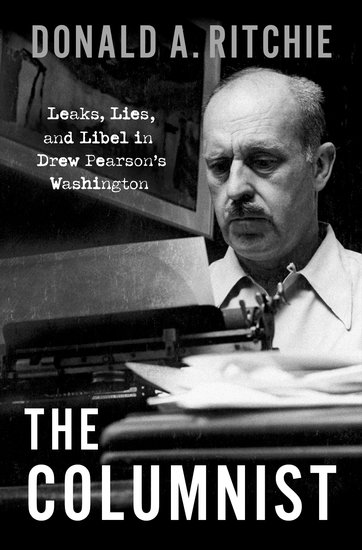“The Columnist:
Leaks, Lies, and Libel
in Drew Pearson’s Washington”
by Donald A. Ritchie

"The Columnist: Leaks, Lies, and Libel in Drew Pearson’s Washington”
by Donald A. Ritchie
New York: Oxford University Press, 2021
A journalist working the Washington, D.C. political beat has always lived a rough and tumble existence. There has never been a golden age when journalists and D.C. power brokers worked hand and hand in their country’s service. Ruthlessness and amorality have always been commonplace. There was a time, however, when journalists and politicians were highly trained, educated, and informed students of their craft, deploying precision weapons in their endless conflict with each other, often to devastating effect. One such master was Drew Pearson, a journalist with immense skills and no scruples, one of the most feared individuals in a city defined by power.
Writing his syndicated column, “Washington Merry-Go-Round” from the Great Depression until the Vietnam War and serving as a gadfly to presidents from Herbert Hoover to Richard Nixon, Pearson explained his philosophy of journalism in instructions to his staff journalists: “It is your job as newspapermen to spur the lazy, watch the weak, expose the corrupt. You must be the eyes, ears, and nose of the American people. Yes, the nose, too, is important. For no matter what stench, you may be exposed to never lose your sense of smell.” The sentiment informing this approach is familiar enough today, with its tinges of Woke self-righteousness and all of its self-appointed social watchdogs.
Unlike many of the self-appointed journalistic crusaders of our own time, however, Pearson backed up his reporting with deep knowledge and expertise. He was proud of being sued for libel more than any other journalist, and even prouder of having won most of his libel suits because the details he uncovered were almost always right. The shots he fired were precisely aimed. But Pearson was no even-handed muckraker (an appellation in which he delighted). He chose his targets based on ideology.
Born Andrew Russell Pearson in Evanston, Illinois, in 1897, and raised in privilege (his father was an English professor), Pearson attended Philips Exeter Academy and Swarthmore College before entering journalism. He was a foreign affairs columnist for the Baltimore Sun in 1931 when he collaborated on a book, “Washington Merry-Go-Round,” that attacked Washington high society and the Republican Party for being arrogant and out of touch while the rest of the country struggled through the Great Depression. Pearson’s writing skill, combined with his access to the upper levels of society, and marriage to the daughter of the wealthiest woman in Washington, D.C., made it natural for him to turn this kind of work into a career. Vaulting to prominence through the success of this book and making it the title of his column, he launched into the controversies of Franklin D. Roosevelt’s New Deal—as a fervent supporter of the president, and the bane of his critics.
Pearson reached the apex of his power and influence during World War II as he walked the narrow line between his support for Roosevelt, and his awareness of corruption and stupidity within the military and the political administration. J. Edgar Hoover’s FBI–and even British intelligence–tailed him, and he often ran afoul of censors. Nevertheless, Pearson kept his “leg men” running to find items worthy of exposure, so long as they did not betray any critical national secrets. And as the war ended, Pearson found a new attack target in the form of President Harry Truman, with whom he frequently clashed as the Cold War began to heat up. When Republican Dwight D. Eisenhower became president in 1953, and Senator Joseph McCarthy launched into his Red-baiting activities, Pearson launched into full crusader mode, becoming an avowed enemy of the political right, and seeking to undermine it at every opportunity.
In time, Pearson became defined as much by his ideology as by his incisiveness and skill. During the presidency of Lyndon B. Johnson, his vociferous support for the president’s Great Society elicited charges that he had been “dog-collared” by the president, becoming “Lyndon’s lackey.” Vietnam forced Pearson to recalibrate his approach, just as it did for others in the media. Once again Pearson found a topic fit for his outrage and—with the election of Richard Nixon as president in 1968—a personal enemy fitted perfectly to bear the brunt of his acid wit. A year later, however, Pearson was dead—five years short of what would have been his greatest political prize, Watergate.
“The Columnist” offers an effective and insightful study of a highly complex individual, who stood as a media powerbroker during some of the most tumultuous decades of the twentieth century. It suggests some interesting parallels concerning the role of partisan journalism, or indeed any kind of journalism, even of the twenty-first century. Pearson’s ruthlessness in pursuit of his political ideals supported and undermined his efforts. Above all, however, Pearson was a professional willing to expend the intellectual effort necessary to study, investigate, and report on the most important people and issues of his time.
Ed Lengel is an author, a speaker, and a storyteller.




